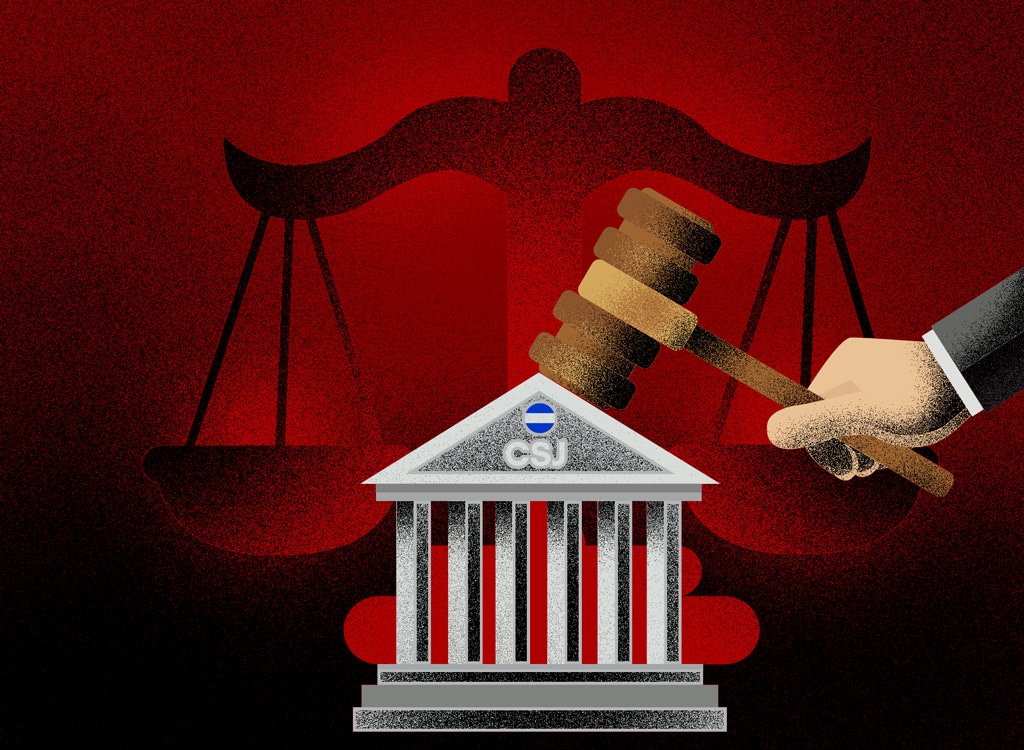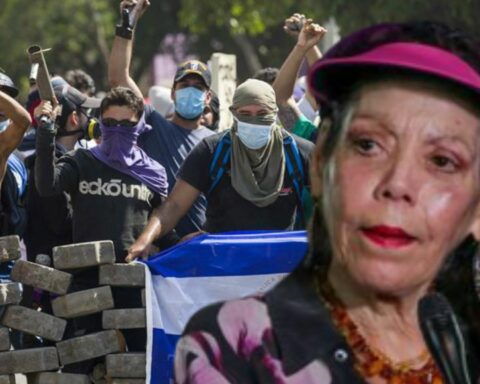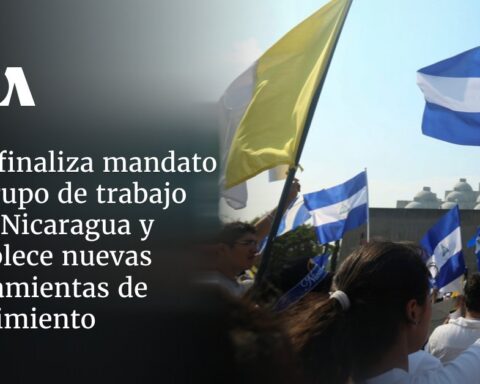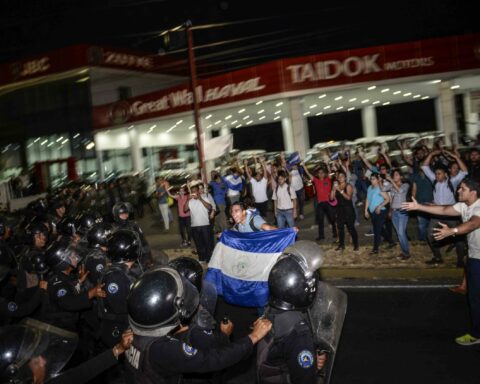The resolution of the European Parliament (PE), demanding sanctions from the European Union against three magistrates of the Managua Court of Appeals (TAM), put the spotlight on one of the judicial instances that actively participates in the repression against political prisoners in Nicaragua.
The Legal Defense Unit (UDJ), an organization that has defended hundreds of prisoners of conscience, reported on May 26 that the sentence against seven prisoners of conscience had been confirmed: Tamara Dávila, Violeta Granera, José Pallais, José Adán Aguerri and former presidential candidates Félix Maradiaga, Arturo Cruz and Juan Sebastián Chamorro.
The authors of the resolution were the magistrates of Appeals, Octavio Rothschuh Andino, Ángela Dávila Navarrete and Rosa Argentina Solís, of the Penal Chamber 1 of the TAM, the same judicial officials for whom the MEPs requested a “financial and personal” punishment.
Javier Nart, one of the European legislators who signed the proposal, explained on June 8 on the television program Esta Noche —hours before the EP resolution, approved with 524 votes, 17 against and 29 abstentions— that it is perceived that there is more impunity in Nicaragua, while he described 14 judges and the three magistrates of Appeals that make up the Ortega judicial machinery as “obscene repressors”.
“Repression is a system, and the system is not the dictatorial autocrat Daniel Ortega and his holy lady (Rosario Murillo, vice president), but rather it is a system that begins with the president, who gives orders to the Ministry of the Interior so that the Police act; the Police is the one who detains and tortures, and then passes it on to the judges, who are the ones who condemn. This is what the Franco regime did, and so did Stalin,” Nart explained.
“Political will to criminalize”
For Alexandra Salazar, one of the members of the UDJ, in the cases against prisoners of conscience there has been a “deliberate will to criminalize” the exercise of citizenship rights such as freedom of expression, association and assembly, in response to a political will that erases the guarantees of due process for those who are prosecuted in the country.
According to the national legal framework, the TAM decides on appeals related to illegal detention (or technically called habeas corpus), where the defenses consider the rights of the defendants to have been violated—those that are usually shelved—, but quickly ratified in recent weeks the sentences of first instance against the opponents of the dictatorship.
Three lawyers consulted, who requested anonymity for fear of reprisals, indicated that the Appeals magistrates are jointly responsible for the crimes of torture and prevarication, the same ones that they would have incurred police, prosecutors and judges committing abuses against political prisoners, according to a series of CONFIDENTIAL on how the judicial machinery operates.
“They (appellate magistrates) are learning about the resources (in favor of the inmates), at least they have to read what the defenses are presenting. In none of the cases has the crime they are accused of been proven,” said one of the sources consulted.
What the regime does with the appeal sentences is an attempt to “legalize” the serious human rights violations committed in the first instance and, as expected, it will follow the same commitment with Ortega at the highest level: The Court Supreme Court (CSJ), where appeals go, said the source.
Read: The 15 judges who execute the orders against political prisoners
Salazar lamented the tragedy that the victims of the system have experienced. “There is no older or younger victim. They have all been from a biased justice system. There is torture, it is not a matter of which (case) is worse. Judicial independence is needed”, he lamented.
The jurist explained that the arrests of political prisoners, carried out for four years, can be considered arbitrary, because they were carried out without an arrest warrant or search warrant, worsening in the cases of departments far from the capital when the detainees were taken from their “natural” judge to be sent to Managua.
Judicial repression: 1,614 detainees in two years
Although the number of prisoners of conscience —cited by the Follow-up Mechanism of their situation— is 182, judicial repression has hit thousands of citizens in the last four years.
At least 1,614 people were imprisoned between April 2018 and October 5, 2020, according to a report on “The Privy of Liberty in Nicaragua in the context of the human rights crisis that began on April 18, 2018”, prepared by the Inter-American Commission on Human Rights (IACHR).
Those captured in that period were sent both to the El Chipote police prison — denounced as a torture center by human rights organizations — and also to dependencies of the National Penitentiary System.
The IACHR cited in its report how justice worked in the TAM in 2018, mentioning cases in which the Police refused to comply with an appeal in favor of one of the inmates, a mechanism that was later changed.
To exemplify, the human rights body attached to the OAS cited the appeal, approved by the Criminal Chamber 2 of the TAM -also managed by the FSLN- of June 8 of that year in favor of human rights promoter Reinaldo Antonio Lira . He could not be executed by a judge, because the Regime Police refused to receive him.
The UDJ has introduced 262 habeas corpus resources: 104 in Criminal Chamber 1 and 110 in Criminal Chamber 2 in Managua and the rest in the departments. With this accumulated experience, Salazar explains that what happened mostly in 2018 is that executing judges were appointed to people who could not practice and parastatal agents, which forced the defenses to request a change of it, while the Police refused. to respond to the complaint. Finally, everything was left with the sending of a “plea to the Supreme Court of Justice”.
“Since the changes in criminalization, they did not even name the executing judges, they sent instructions to the Police and this institution responded that (those arrested) were under investigation, despite the fact that the detention is arbitrary and their release should be ordered” Salazar added.
Since 2021, the UDJ has also introduced 16 appeals against sentences against prisoners of conscience. These detainees correspond to those captured during the repressive escalation, with which the dictatorship eliminated electoral competition to guarantee the re-election of Ortega and Murillo, sowing fear among the citizenry.
The State did not collaborate in that sense either. Generally, the defense of political prisoners have a term of 10 days to appeal the sentences, but when dealing with “complex processing” investigations, the time is doubled. So the party bureaucracy plays against human rights.
The jurist denounced that the TAMs do not even provide them with photocopies of the sentences. “They tell you that they are in a meeting; that (the file) is not authorized, it should be guaranteed (to the defense) that it has access to the sentences at the time they are issued. Or that a copy be sent along with the notification or the loan of the file should be guaranteed so that it can be accessed, ”suggested Salazar.
These obstacles in the judicial processes of Ortega, or the speed to confirm the convictions recently seen, is explained by the fact that the Appeals magistrates subordinate their decisions to the will of the ruling party.
Another lawyer lamented the obedience of judicial officials to Ortega. “If the Appeals magistrates had independence, they should analyze each one of all the irregularities that take place during the process. Then they would revoke the sentences so full of nullities, but they are ratifying them. That is only explainable in a country with the situation of institutional deterioration in Nicaragua,” he added.
The partisan life of the magistrates of Chamber 1
According to a newspaper review, magistrate Octavio Rothschuh Andino is a FSLN militant. In 2019, she participated in the anniversary of the Sandinista revolution, accompanying the then president of the TAM, Gerardo Rodriguez, dismissed two years later for processing an appeal from the Citizens for Freedom party. In the photo was also the magistrate Edgar Altamirano.
It is not the only case of full identification with the FSLN in the judicial structure. In December 2021, Rothschuh’s colleague, Ángela Dávila Navarrete, celebrated 40 years of working in the Judiciary.
“After the triumph of the revolution there were no judges left in Managua, I found out about some scholarships to be technical judges and I went to study. So they told me that new positions would be opened for judges in Managua, I did my internships and in the end I was selected,” Dávila Navarrete told the Official site of the CSJ.
According to the judicial source, Dávila Navarrete is close to the government party, which explains his permanence in Appeals, given the total control that the Regime has at all levels of the judicial apparatus, which prevents any type of internal opposition.
Appeals Judge Rosa Argentina Solís was identified in The newspaper La Prensa as a member of the Departmental Council of the FSLN in Managua and as political secretary of the ruling party in the June 9 neighborhood.
Solís is the daughter of the historical collaborator, Aura Donatila Dávila, who died in October 2019, which led to a statement by Vice President Rosario Murillo, in her midday speeches.“Doña Aura Dávila was a safe house for the Sandinista Front in the 1960s and is the sister of the hero Róger Núñez Dávila, who fell fighting alongside Leonel Rugama in the Eastern Cemetery,” Murillo said when expressing his condolences to the magistrate.
The dominance of the FSLN in Room 2 of the TAM is repeated, although they followed another path for control in this case.
Criminal Chamber 2: An ex-liberal joined the Sandinistas
According to official records, the three magistrates of this Appeals Unit are Martha Quezada, Ingrid Lazo and Noel Pereira Morice.
The best known official of the three mentioned is the magistrate of Martha Quezada, who is remembered for being the judge who filed the case of Zoilamerica Narvaezwho denounced his stepfather Ortega in 1998 for sexual abuse.
Both Lazo and Pereira Morice come from the liberal ranks linked to former president Arnoldo Alemán, Ortega’s political partner since 2000. However, it was Judge Lazo who openly supported the decisions of the FSLN.
“Dr. Lazo entered as a supposed Arnoldist. There was a vacancy and they appointed her a district judge. After her, magistrate Denis Maltez, a close friend of Alemán, died and she was promoted from her. With all of this (of the FSLN’s control of justice) she bows to them”, explains the jurist, recalling her trajectory.
Lazo is the wife of Sandinista humorist José Ramón Quintanilla, known as JR. On her part, Pereira Morice is the son of the Arnoldist lawyer, Noel Pereira Majano, who died in 2011.







